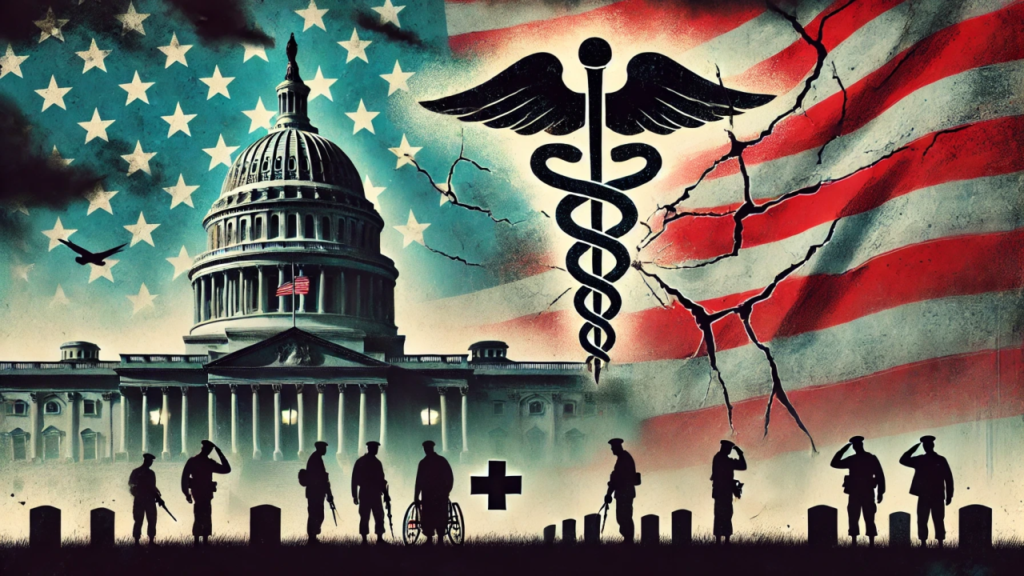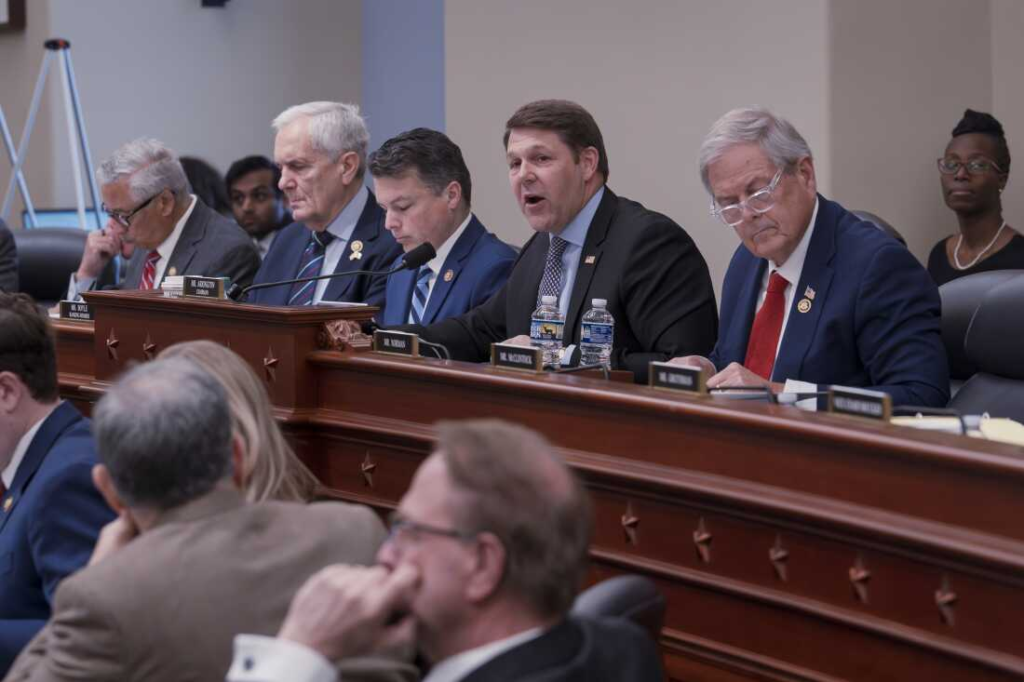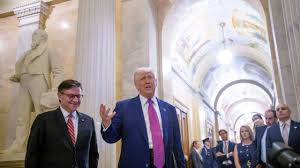The recent Republican-led proposal for a federal spending bill has sparked intense debate across the United States, Groups particularly among veterans’ advocacy groups. The bill, which includes significant cuts to Medicaid, has divided organizations dedicated to veterans’ welfare. Some groups argue that the reductions could severely impact veterans who rely on Medicaid for healthcare, while others believe the cuts are necessary to address broader fiscal concerns. This issue has ignited discussions about balancing budget constraints with the needs of those who have served the nation. As the debate unfolds, veterans and their advocates are grappling with the potential consequences of these proposed changes.

Background on the GOP Spending Bill
The proposed spending bill, introduced by Republican lawmakers in early 2025, aims to reduce federal spending to address rising national debt and inflation concerns. Among its key provisions are substantial cuts to Medicaid, a program that provides healthcare coverage to millions of low-income Americans, including many veterans. According to reports from USA Today, the bill seeks to streamline federal programs and redirect funds to other priorities, such as tax cuts and infrastructure. However, the proposed reductions have raised alarms among groups who fear the impact on vulnerable populations, particularly veterans who depend on Medicaid for medical care. USA Today
Medicaid plays a critical role in the healthcare system for veterans who may not qualify for full Veterans Affairs (VA) benefits or who face gaps in coverage. For many, it serves as a lifeline for accessing essential services like mental health care, long-term care, and treatment for chronic conditions. The proposed cuts, estimated to reduce Medicaid funding by up to 20% over the next decade, could limit access to these services, leaving veterans in a precarious position.

Veterans Groups Voice Concerns
Veterans’ organizations have responded to the bill with a mix of criticism and cautious support, reflecting the complexity of the issue. Groups like VoteVets, a progressive veterans’ advocacy organization, have strongly opposed the cuts, arguing that they would disproportionately harm veterans who rely on Medicaid. In a recent statement, VoteVets highlighted that the reductions could “rip Medicaid from veterans” and “slash benefits for those still covered,” potentially reversing progress made in reducing uninsured rates among veterans. They argue that the cuts prioritize tax breaks for wealthy individuals over the well-being of those who have served.
On the other hand, some conservative-leaning veterans’ groups, such as the American Legion, have taken a more measured stance. While not fully endorsing the cuts, they acknowledge the need for fiscal responsibility. In a statement to Military.com, a representative from the American Legion noted that while veterans’ healthcare must remain a priority, the organization understands the broader economic challenges facing the nation. They have called for a balanced approach that protects veterans’ benefits while addressing budgetary concerns. Military.com
This split reflects a broader ideological divide. Progressive groups view Medicaid as an essential safety net, while conservative groups often emphasize the importance of reducing federal spending to ensure long-term economic stability. The disagreement has created tension within the veteran community, with advocates on both sides urging lawmakers to consider the real-world implications of the bill.
The Impact on Veterans
For veterans, the stakes are high. According to the Kaiser Family Foundation, approximately 1.2 million veterans rely on Medicaid for healthcare coverage, either as a primary source or as a supplement to VA benefits. Many of these individuals are older, disabled, or low-income, making them particularly vulnerable to changes in the program. Cuts to Medicaid could result in reduced access to critical services, including mental health treatment, prescription drugs, and long-term care facilities. Kaiser Family Foundation
Veterans living in rural areas may be especially affected, as they often face challenges accessing VA facilities due to distance or limited availability. For these individuals, Medicaid provides a critical alternative for receiving care closer to home. A report from the Center on Budget and Policy Priorities estimates that the proposed cuts could lead to 4 million fewer people enrolled in Medicaid nationwide by 2030, with veterans making up a significant portion of those affected.
Personal stories highlight the human cost of these potential changes. John, a 62-year-old Vietnam War veteran from Ohio, shared his experience with NPR, explaining that Medicaid covers his diabetes treatment and mental health counseling—services he cannot access through the VA due to long wait times. “If they cut Medicaid, I don’t know how I’ll manage,” he said. Stories like John’s underscore the real-world implications of policy decisions and have fueled calls for lawmakers to reconsider the cuts.

Supporters of the Bill
Despite the backlash, some argue that the proposed Medicaid cuts are a necessary step to address the nation’s fiscal challenges. Republican lawmakers behind the bill contend that reducing federal spending is essential to curb inflation and reduce the national debt, which currently stands at over $33 trillion. They argue that streamlining programs like Medicaid will create a more efficient system, allowing funds to be redirected to other pressing needs, such as national defense and infrastructure improvements.
Some veterans’ groups align with this perspective, emphasizing the importance of long-term economic stability. The Concerned Veterans for America, a conservative advocacy group, has expressed support for reforms that reduce government spending while ensuring that veterans continue to receive high-quality care through the VA. They argue that the VA system, which serves over 9 million veterans, should be strengthened to fill gaps left by Medicaid reductions.
Proponents also point out that the bill includes measures to improve VA services, such as increased funding for mental health programs and expanded telehealth options. These enhancements, they argue, could offset the impact of Medicaid cuts by providing veterans with alternative avenues for care.
The Path Forward
As the spending bill moves through Congress, veterans’ groups are intensifying their advocacy efforts. Progressive organizations are mobilizing grassroots campaigns to pressure lawmakers into rejecting the Medicaid cuts, while conservative groups are pushing for reforms that balance fiscal responsibility with veterans’ needs. Both sides agree that protecting veterans’ healthcare is a priority, but they differ on how to achieve that goal.
Lawmakers face a delicate balancing act. On one hand, they must address concerns about the national debt and economic stability. On the other, they must ensure that veterans, who have sacrificed so much for the country, are not left without access to essential healthcare services. The outcome of this debate will likely depend on negotiations in Congress and the ability of advocacy groups to sway public opinion.
Public sentiment, as reflected in recent posts on X, shows a mix of frustration and concern. Many users have expressed outrage over the potential cuts, arguing that veterans deserve better treatment. Others, however, believe that tough choices must be made to secure the nation’s financial future. These discussions highlight the complexity of the issue and the need for a solution that addresses both economic and humanitarian concerns.
Conclusion
The proposed Medicaid cuts in the GOP’s spending bill have exposed deep divisions among veterans’ groups and the broader public. While some see the reductions as a necessary step toward fiscal responsibility, others warn that they could devastate veterans who rely on the program for critical healthcare services. As Congress debates the bill, the voices of veterans and their advocates will play a crucial role in shaping the outcome.
The debate underscores a fundamental question: how can the nation honor its commitment to veterans while addressing broader economic challenges? Finding a solution will require compromise, empathy, and a commitment to ensuring that those who have served are not left behind. As the discussion continues, veterans and their families across the country will be watching closely, hoping for a resolution that prioritizes their well-being.
Also Know :- Dow Surges 740 Points on Eased Trade Tensions, Marking Best Day in 2025






